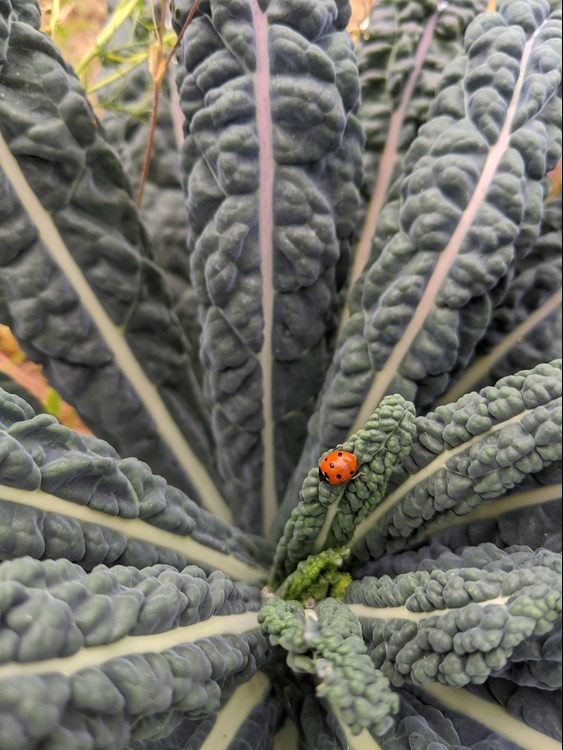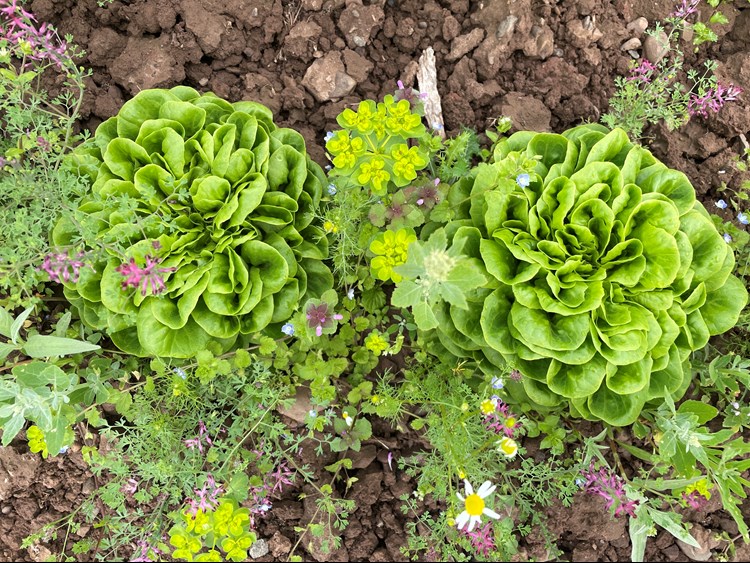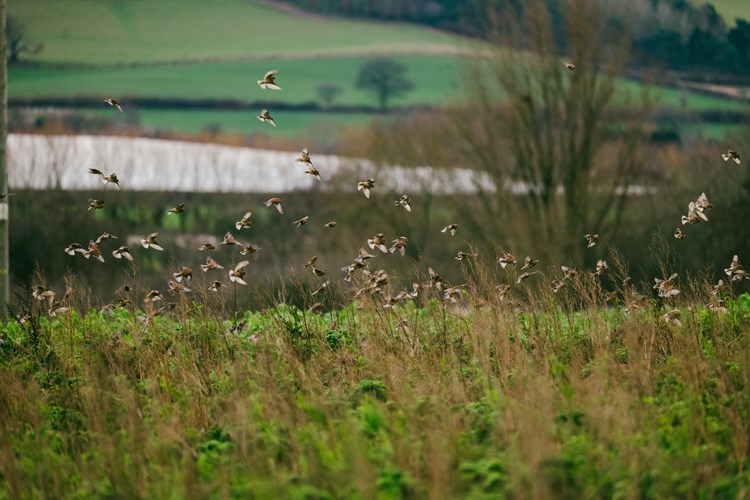For over a year, our Soil Association Farmer Ambassadors have been helping us to showcase the benefits of agroecology, sharing the amazing work they’re doing on their land to protect the climate and our natural landscapes.
Agroecology is sustainable farming that works with nature, and it’s something that Ben Andrews, one of our ambassadors and an organic mixed farmer based in Herefordshire, takes very seriously! Over the years, he’s used nature-friendly methods to boost his farm’s productivity, engage with the environment and manage pests in a sustainable way. Read on to discover some of his tried and tested agroecological practices.
These ingredients are a lot safer to other wildlife than conventional pesticides… but even still, we don’t use products unless there is a real need to. Prior to making any decisions, we’ll extensively walk through our fields, looking for pests, to identify whether or not we think additional input is appropriate. It’s all about context, which comes from knowing your land and the ecosystems at play there. If we see aphids on our lettuces, for instance, we’ll just leave them – we know that we have enough ladybirds on our farm to manage their levels! In fact, it’s now been over five years since we used any natural pesticides on our lettuce. The biodiversity we’ve cultivated here is doing that work for us.
On that note, we have only ever used organic-permitted pesticides when there are very large swathes of pests on our land – we never use these products routinely. We leave it largely up to nature to sort things out!

On the hunt for aphids...
Organic farmers are permitted to use just 20 pesticides (compared to hundreds in non-organic farming). These 20 pesticides are derived from natural ingredients - things like citronella and clove oil, and are only permitted under very restricted circumstances. Learn more about organic systems.
As mentioned, we currently leave it to ladybirds to control the aphid levels around our lettuces. We didn’t always do this, and were once using natural pesticides like chrysanthemum extract to keep them under control. But this caused harm to both the ladybirds and pollinators, so one year, we just decided to leave the aphids alone to see what would happen. Ladybird numbers and their larvae increased, took the aphid numbers down to a manageable level, and we haven't had to use anything since!
We do a lot to introduce and keep wildlife on our farm, too. What it comes down to is creating little ecosystems across your land, and making sure it’s not a barren environment or monoculture. Some things we’ve done so far include:

Growing with nature
Knowing your land well is fundamental to managing pests. Are you on soil that’s prone to slugs, for instance? If so, try to avoid growing crops that they are likely to feast on. Understanding the pests that thrive in your area will help you to choose produce that doesn’t appeal as much to them. Other than that, just do what you can to support your local wildlife and nature, and let your land get a little messy! Your farm is likely to do its best work when the areas around and within it are not pruned and polished.
Making your farm as naturally sustainable as possible is so important, as well - particularly now. Traditionally, one of the biggest threats to aphid and other pest numbers has been the frosts in winter, so climate change is a real worry. With warmer, wetter winters ahead, it’s inevitable that the agriculture industry is going to see some new pests… so make sure you nurture the ecosystems on your farm to give it the best possible chance of staying robust when faced with these obstacles.
At our organic farm, we're always looking for new ways to continue to bridge the gap between nature and our practices. One of the projects we're currently working on is restoring and establishing a good network of hedgerows, which encourages lots of insect life. We plan to include flowering plants, such as cow parsley, which not only attract pollinators but also feed ladybirds when they’re not eating aphids.
The other key, of course, is to never let pest levels grow out of control. Rotating your crops is a big part of that. If you grow the same thing in the same place year after year, you’ll build up a reservoir of some pests and diseases. It’s important to keep changing where you grow your produce, along with what you grow, so pests can’t embed themselves into certain areas of your land.
You’ve just got to work with nature, wherever you can. There’s so much money thrown at developing new pesticides, and so little done on integrated pest management and managing pests without using chemicals. Getting conventional farms to reduce their chemical use is a start, even if they don’t stop completely overnight. Resistance to these products does always build up, because nature always ends up winning – that’s why even organic farmers should only use the natural pesticides available to them as a last resort. You’ve got to work with nature as closely as possible, because you’ll never win in a fight against it.

Agroecology is sustainable farming that works with nature, and it’s something that Ben Andrews, one of our ambassadors and an organic mixed farmer based in Herefordshire, takes very seriously! Over the years, he’s used nature-friendly methods to boost his farm’s productivity, engage with the environment and manage pests in a sustainable way. Read on to discover some of his tried and tested agroecological practices.
Is there a place for pesticides in organic farming?
Unlike conventional farmers, organic farmers don’t have the same arsenal of chemicals to use when facing problems on their land, but we do have some natural alternatives. When managing pests, we occasionally use a product called FLiPPER, which is a byproduct from olive oil production – it’s an organic fatty acid, essentially, like soap. It’s great for controlling aphids. On that note, iron phosphate can be used to manage slugs, and a bacteria called 'bacillus thuringiensis' can be used to deal with caterpillar infestations.These ingredients are a lot safer to other wildlife than conventional pesticides… but even still, we don’t use products unless there is a real need to. Prior to making any decisions, we’ll extensively walk through our fields, looking for pests, to identify whether or not we think additional input is appropriate. It’s all about context, which comes from knowing your land and the ecosystems at play there. If we see aphids on our lettuces, for instance, we’ll just leave them – we know that we have enough ladybirds on our farm to manage their levels! In fact, it’s now been over five years since we used any natural pesticides on our lettuce. The biodiversity we’ve cultivated here is doing that work for us.
On that note, we have only ever used organic-permitted pesticides when there are very large swathes of pests on our land – we never use these products routinely. We leave it largely up to nature to sort things out!

On the hunt for aphids...
Organic farmers are permitted to use just 20 pesticides (compared to hundreds in non-organic farming). These 20 pesticides are derived from natural ingredients - things like citronella and clove oil, and are only permitted under very restricted circumstances. Learn more about organic systems.
How do you manage pests using agroecological methods?
By boosting biodiversity and encouraging natural predators onto our land, we've been able to reduce our reliance on natural pesticides by a huge degree.As mentioned, we currently leave it to ladybirds to control the aphid levels around our lettuces. We didn’t always do this, and were once using natural pesticides like chrysanthemum extract to keep them under control. But this caused harm to both the ladybirds and pollinators, so one year, we just decided to leave the aphids alone to see what would happen. Ladybird numbers and their larvae increased, took the aphid numbers down to a manageable level, and we haven't had to use anything since!
We do a lot to introduce and keep wildlife on our farm, too. What it comes down to is creating little ecosystems across your land, and making sure it’s not a barren environment or monoculture. Some things we’ve done so far include:
- Intercropping with our brassicas – for every 10th row of kale we plant, we’ll add a mixture of buckwheat and phacelia flowers, which appeal to beneficial insects like hoverflies, lacewings and ladybirds (that then take care of the pests that may want to snack on our crops)
- Using wild bird seed mix to welcome beneficial birds onto our land – including types like skylarks, wagtails, pipits and thrushes, that eat the slugs and bugs they spot on our leaves
- Strategically allowing some weeds to grow – as these can attract more great species, like yellowhammers (for instance), which snack on their seeds!
- Only trimming our healthy hedgerows every few years - allowing them to grow 'wildly' and better serve a biodiverse landscape.

Growing with nature
Knowing your land well is fundamental to managing pests. Are you on soil that’s prone to slugs, for instance? If so, try to avoid growing crops that they are likely to feast on. Understanding the pests that thrive in your area will help you to choose produce that doesn’t appeal as much to them. Other than that, just do what you can to support your local wildlife and nature, and let your land get a little messy! Your farm is likely to do its best work when the areas around and within it are not pruned and polished.
Making your farm as naturally sustainable as possible is so important, as well - particularly now. Traditionally, one of the biggest threats to aphid and other pest numbers has been the frosts in winter, so climate change is a real worry. With warmer, wetter winters ahead, it’s inevitable that the agriculture industry is going to see some new pests… so make sure you nurture the ecosystems on your farm to give it the best possible chance of staying robust when faced with these obstacles.
At our organic farm, we're always looking for new ways to continue to bridge the gap between nature and our practices. One of the projects we're currently working on is restoring and establishing a good network of hedgerows, which encourages lots of insect life. We plan to include flowering plants, such as cow parsley, which not only attract pollinators but also feed ladybirds when they’re not eating aphids.
Are there any other considerations farmers need to bear in mind when it comes to dealing with pests?
The key is to not completely wipe out pest species on your land. People often want to eradicate every aphid or caterpillar on the farm, but if there’s nothing to eat your crops, the ecosystems you’re trying to create will struggle to form. That’s what we did with our lettuces the first time: we saw aphids, and thought we would get rid of them all with a natural chemical. Like I said, that did more harm than good, whereas when we left the aphids and allowed the ladybirds to come in and deal with them, we tapped into a much more sustainable, beneficial and nature-friendly way of coping with the problem.The other key, of course, is to never let pest levels grow out of control. Rotating your crops is a big part of that. If you grow the same thing in the same place year after year, you’ll build up a reservoir of some pests and diseases. It’s important to keep changing where you grow your produce, along with what you grow, so pests can’t embed themselves into certain areas of your land.
You’ve just got to work with nature, wherever you can. There’s so much money thrown at developing new pesticides, and so little done on integrated pest management and managing pests without using chemicals. Getting conventional farms to reduce their chemical use is a start, even if they don’t stop completely overnight. Resistance to these products does always build up, because nature always ends up winning – that’s why even organic farmers should only use the natural pesticides available to them as a last resort. You’ve got to work with nature as closely as possible, because you’ll never win in a fight against it.






